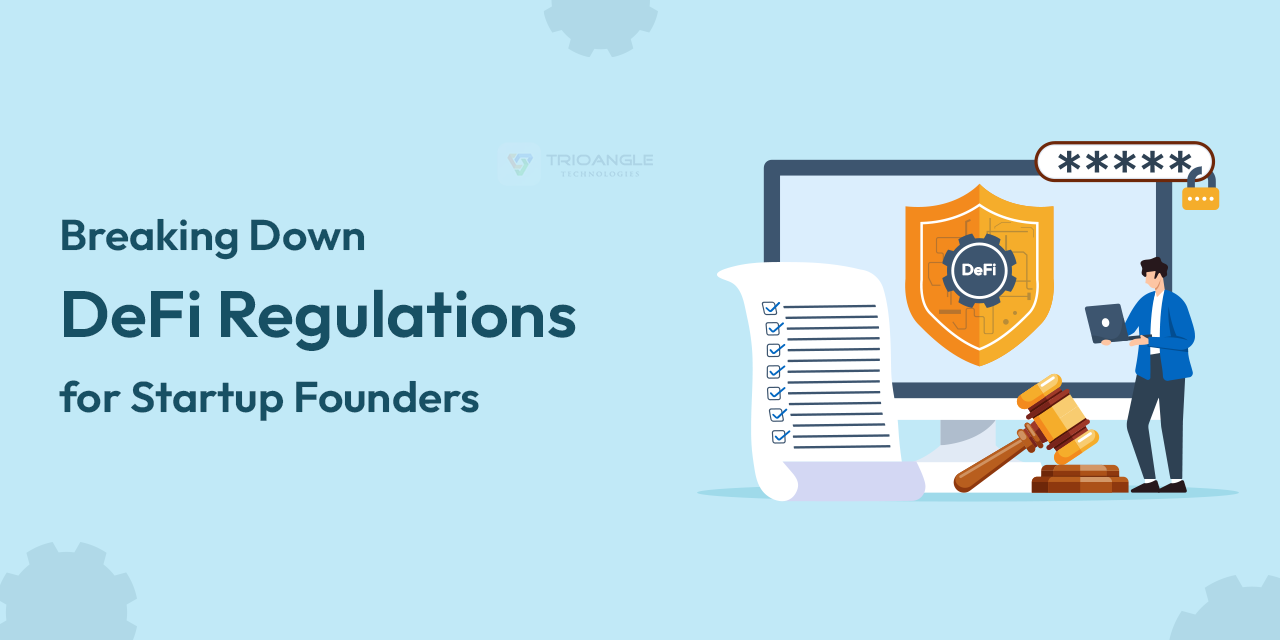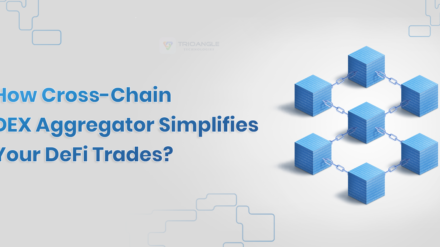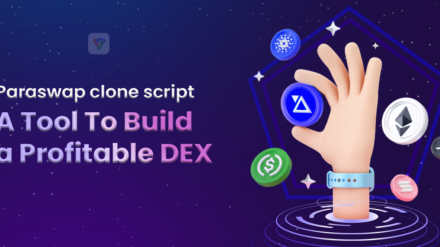So, you’ve finally decided to build a DeFi platform. You’ve analyzed competitors, assessed market needs, and everything is set. But most founders ignore one important area: DeFi regulations.
Understanding the regulations is an important thing when it comes to operating a venture. Remember: This factor will make or break your startup.
In this blog, I’ll break down the DeFi regulations you must be aware of before starting your business with a DeFi solution.
Let’s get started!
Let’s explore the basics first, let’s see…
What are DeFi Regulations?
The term “DeFi regulations” refers to the rules that governments apply to financial services, especially for decentralized finance protocols. Governments implement these rules with the aim of protecting users from scams and money losses.
Instead of manual processes, DeFi uses blockchain and smart contracts to operate on its own. The government’s question is: Who takes responsibility if something goes wrong? Who gives support when there is no management, no office, no company, and no identity verification?
That’s why regulators are moving closer to DeFi. Even if your DeFi project runs on a DAO (decentralized autonomous organization), the government says platform owners are responsible for everything that happens on your platform.
If you have a DeFi business idea and want to provide a crypto financial service with a DeFi protocol, as a founder, you must understand and give more importance to DeFi regulations. You need to structure your solution to meet all regulatory requirements.
But…
Why It’s Important For Startups To Understand DeFi Regulation?
Ignoring rules might be easy, but here’s how it will impact you in the future:
- You will design your DeFi project with a focus on adapting globally. But some regions may require different laws. If you fail to implement them, then the chances that your platform could get banned or blocked in some countries or areas are high. In some rare cases, it may lead to a shutdown.
- When you work on a big project, get audits, or list your tokens on other exchanges, they ask for proofs and cross-check if your platform meets the legal requirements. If not, your platform may lose trust and miss some opportunities to grow.
- Even if your project is decentralized and you control only the key components like code and functionality, the responsibility falls on your head when anything goes wrong. This may result in fines, penalties, and other major issues for your DeFi platform.
- If you wish to raise funds from venture capitalists or other investors, you need to prove to them that your platform aligns with the DeFi regulations. They usually avoid legal breaches. If your platform is not completely prepared, you may miss out on funding that helps your startup grow.
Now, let’s break down the core concept you’re here to learn about.
So, “What DeFi regulations do I need to follow before starting my business with a DeFi solution?”
DeFi regulations changes depending on different countries or regions. Let me break down the DeFi rules required for some top countries.
1. United States
The United States (US) has a complicated regulatory environment. The U.S. has multiple agencies overseeing crypto and DeFi: the SEC, CFTC, FinCEN, OFAC, and IRS.
- SEC (Securities and Exchange Commission): They ensure that your token is a security (like investment or stock). If yes, they are required to register or qualify for an exemption.
- CFTC (Commodity Futures Trading Commission): They likely oversee commodities and derivatives like perpetual swaps and synthetic assets.
- FinCEN (Financial Crimes Enforcement Network): They monitor Anti-Money laundering (AML) rules. If your business acts as a Money Services Business (MSB), like exchanging crypto into fiat currencies, then you’re asked to register.
- OFAC (Office of Foreign Assets Control): They verify that you’re not running your platform in the banned countries.
- IRS (Internal Revenue Service): Manages tax reporting requirements related to crypto transactions.
Now, what does that mean for DeFi projects?
- If you launch a token that people buy with the intent to make a profit, then it may be considered a “security”. You need to register with the SEC.
- If your platform offers margin trading or perpetual contracts, the CFTC may regulate your activities.
- If your platform allows users to convert fiat money to cryptocurrency, then you must register as an MSB with FinCEN and follow AML rules.
2. Singapore
Singapore is a crypto-friendly region. But they are aware of some DeFi regulations like AML (Anti-Money Laundering) and investor protection. Under the Payment Services Act (PSA) and the Financial Services and Markets Act 2022 (FSMA), the regulatory landscape has evolved.
- If your platform lets users buy, sell, or hold digital tokens, then you must be registered or licensed with the Monetary Authority of Singapore (MAS). This applies if you’re target users are in Singapore.
- If your business offers tokens, yield services, or helps with liquidity (making it easier to trade), then you must follow the PSA (Payment Services Act) rule.
Fresh Insight: The Monetary Authority of Singapore (MAS) requires DeFi platforms that are situated in Singapore but offer services outside Singapore to be compulsorily registered under MAS. They have set a deadline for the end of June 2025 and have clearly stated that there will be no grace period with this DeFi regulation.
Tip: If you operate your platform in Singapore, then consult with MAS early; they support innovations in DeFi, but they expect transparent and risk controls.
3. European Union
The European Union (EU) has introduced a major rule called MiCA (Markets in Crypto Assets Regulation). This aims to bring more clarity regarding crypto and DeFi regulations.
Here’s what you need to know.
- The rules for stablecoins (called Asset Referenced Tokens and E-Money Tokens) are already applicable from June 30, 2024. However, some EU countries offer transitional periods, possibly extending to June 2026.
- MiCA applies if your DeFi protocol operates in the European Union (EU) or serves EU people or markets.. Although they say these rules will not apply to “fully decentralized” platforms, it’s still “UNCLEAR”.
- If your project manages the front-end, governance, or actively markets itself, regulators might still ask you to obtain a Crypto-Asset Service Provider (CASP) license.
Other DeFi Regulations to Follow:
- DORA, the EU’s Digital Operational Resilience Act, came into force on January 17, 2025. This ensures crypto platforms manage cybersecurity risks and IT system resilience.
- NIS2 Directive: It ensures stronger cybersecurity standards for all EU digital services, including DeFi.
Tip: If your DeFi platform is not fully “decentralized,” then follow all traditional regulations with a DeFi blend.
4. United Kingdom
Regulators in the United Kingdom (UK) employ rules based on the services provided. Under the Financial Services and Markets Act 2000, as amended by the 2025 Cryptoassets Order, operating a DeFi protocol in the UK now requires regulatory permission from the Financial Conduct Authority (FCA)
Offering services like lending, staking, borrowing, or running a trading platform are now considered regulated financial services under the Financial Services and Markets Act (FSMA).
In May 2025, the FCA proposed strict rules for crypto custody, stablecoins, including 1:1 reserve banking, clear redemption rights, and robust customer protection.
Even if your platform tends to be “decentralized”. However, it must follow some DeFi regulations if you or your team controls the front-end, governance, and manages the protocol.
Tip: If your DeFi project includes some centralized features or targets UK users, you need to follow regulations. Follow UK rules while marketing. Getting legal guidance early on can help you stay on the right side of regulations.
5. Dubai
In May 2025, Dubai’s Virtual Assets Regulatory Authority (VARA) issues Rulebook 2.0, a full regulatory upgrade.
They say that any platforms offering trading, lending, borrowing, staking, liquidity services, token issuance, or custody must now hold a VARA license.
Here’s the list of key regulations you need to keep in mind.
- Stricter margin trading rules and limits.
- Token issuers must submit whitepapers, clear disclosures, and follow proper distribution protocols.
- Custody providers must segregate assets, hold insurance, and ensure reserve checks.
- Sponsored VASPs allow smaller entities to operate under a licensed sponsor.
Even if your front-end is based in Dubai, you must follow Anti-Money Laundering (AML) and Know Your Customer (KYC) laws.
Tip: Dubai supports DeFi innovations, but your platform needs to follow VARA’s latest rules on licensing, security, and promotion.
What Are the Regulatory Approaches in Other Countries?
So, if you’re planning to establish your DeFi protocol in other countries or want to offer services to other regions that were not listed in the blog, then here’s the key note.
- First, understand your niche and the type of services your DeFi solution offers. Then, identify which country has the highest demand for those services. Establishing your presence where demand is strong increases your chances of success.
- Always look for a place that fits your stage. Explore countries that support new ideas. Later, when you grow, you might need a location that supports full legal compliance.
- Beyond crypto laws, also think about taxes, company setup, team hiring, and other key factors.
- Transparency is a key. While starting your DeFi venture, publish clear disclaimers. Be honest about risks and document everything.
- Always remember your audience. Even if your team is based in one country, you might still have to follow the rules of another country if your users are there.
- Even if you’re not located in a specific country, regulators may apply rules if your users are from that country.
Final Thoughts: DeFi Regulations Keep Changing
If you’re going to start a DeFi venture, then remember one thing. “Regulations are not fixed, they’re always changing”.
What’s allowed today could be restricted tomorrow. In the future, some countries may tighten their rules, and others might be open. This industry shifts by the second—ensure your approach evolves with it.
- Keep yourself updated on the country’s DeFi and crypto rule changes.
- Always be ready to adjust your plan if needed.
- Avoid assuming “decentralized” means you don’t need to follow any DeFi regulations.
Before building your DeFi software, it’s always advisable to “TALK WITH A LEGAL EXPERT”. Consult with the legal advisers and people who understand crypto and the country’s rules.
“So, where can I safely build my DeFi platform while complying with DeFi regulations?”
Trioangle will be the smart choice, as a trusted DeFi development company, they are skilled in crafting high-performing, intuitive DeFi solutions that fit with DeFi regulations based on your business vision. Our team is always ready to assist you if you’re new to this space and want to start a DeFi venture with decentralized solutions.
Got a DeFi Business Idea?








